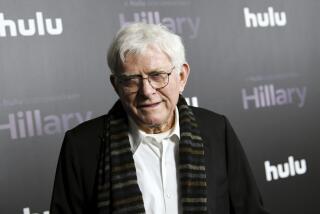Paul Duke, 78; Host of PBS’ ‘Washington Week in Review’
- Share via
Paul Duke, who lent both grace and gravitas to PBS’ public affairs program “Washington Week in Review” as its host for two decades, has died. He was 78. Duke died Monday night of leukemia at his home in Washington, D.C.
Gwen Ifill, the moderator and managing editor of the show now called “Washington Week,” said Duke’s “sensibilities, wit and love of the news was the heart and soul of ‘Washington Week in Review.’ ”
“Paul believed, above all, that journalism could be honorable, reporting could be lacking in bias, and that news analysis benefits more from light than heat,” Ifill said. “He was right. A lot of us still try to adhere to those principles.”
The program, which became PBS’ longest-running public affairs show, was 7 years old when Duke came on board in 1974. At that time, about 1.5 million viewers watched the live weekly wrap-up of capital happenings as described by reporters from major publications. Duke helped build the audience to 4.6 million by the time he retired in 1994.
While other talk shows introduced shouting matches, sarcasm and flashy video footage, Duke kept “Washington Week” subdued and informative. Discouraging expressions of opinion, he once described his Emmy Award-winning show for Broadcasting magazine as “straightforward, old-fashioned, candid reporting in a very civilized way.”
Asked the secret of the program’s success at its 25th anniversary in 1992, Duke told The Times, “Because it is so plain ... [and] we just established a good reputation of reliability and credibility over the years.”
Duke, who frequently lamented the “intrusion of show business into the news business,” preferred to enlist print journalists to relate major stories each week, considering them better informed and more credible than television correspondents. His cadre of regulars welcomed the invitations, less for their $300 per show fee than for the lucrative lecture circuit invitations and attention from politicians that each appearance garnered.
The moderator’s low-key manner, and that of the show he created, became the stuff of good-natured ribbing as well as admiration. When “Washington Week” observed its 20th anniversary in 1987, former Senate minority leader and presidential candidate Bob Dole told celebrants: “Paul Duke had a mild case of charisma, but as you can plainly see, he was able to shake it off.”
Duke was already a veteran congressional correspondent when he joined the public network. He interviewed government officials for PBS’ “Washington Straight Talk” and was the host of “The Lawmakers,” a series about Congress. He also covered the Senate Watergate hearings, which he considered the major story of his career.
“Never take yourself too seriously,” he told Washingtonian magazine at his retirement when asked what he had learned from his many decades of covering Washington. He went on to quote former Supreme Court Chief Justice Oliver Wendell Holmes, who, when asked the secret of his success, replied, “I discovered at an early age that I was not God.”
Long after he stepped down, Duke returned occasionally to host “Washington Week,” including a three-month stint in 1999. He also continued to do other programs for PBS and its Washington affiliate WETA-TV. Among those were commentaries from London, where he lived for a time, and in 2000, “The Great Campaign of 1960,” a reminiscence by reporters and other insiders about the presidential campaign of John F. Kennedy versus Richard M. Nixon.
Born Paul Welden Duke in Bethlehem, Pa., and brought up in Richmond, Va., Duke demonstrated a flair for journalism at age 13, when he created and distributed a handwritten neighborhood newspaper. By age 16, he was doing news on a local radio station, and at 18, he had a nightly sportscast, soon adding a sports column for Associated Press.
After graduating from the University of Richmond in 1947, Duke went to work for the wire service in Richmond covering the Virginia legislature. Nine years later, still with Associated Press, he moved to Washington to cover national politics and Congress. In 1959, he became a congressional and political correspondent for the Wall Street Journal, and four years later, he began his television career, covering Congress for NBC News for a decade.
“It just seems to me that the legislative process constitutes the marketplace of democracy,” he told The Times in 1981, when he was host of “The Lawmakers.”
“There are good guys, bad guys, clashes, compromises -- the whole human drama can be found there, and it just goes on constantly.... For an enterprising reporter, it’s a never-ending field day.”
Duke served as president of the Radio and Television Correspondents Assn. in 1977 and was a trustee of the University of Richmond.
He is survived by his second wife, the former Janet Wachter, whom he married in 1985; one son, Paul Francis Duke; a stepdaughter, Amy Rider; and one step-grandchild.
More to Read
The complete guide to home viewing
Get Screen Gab for everything about the TV shows and streaming movies everyone’s talking about.
You may occasionally receive promotional content from the Los Angeles Times.






